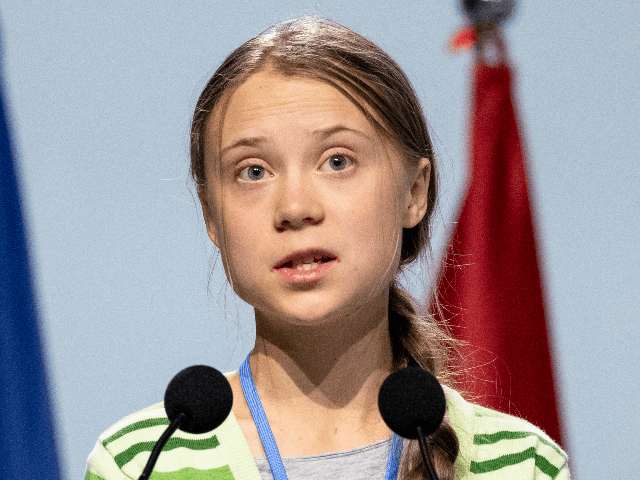Celebrated Swedish climate scold Greta Thunberg has given the world a Valentine’s Day present in the form of her newly published The Climate Book, a diatribe against fossil fuels, “capitalist consumerism,” and the “global north.”
Published Tuesday by Penguin Press, the 464-page tome urges readers to “listen to the science” before it’s too late, in a smartly repackaged but ultimately predictable and unconvincing crusade to scare humanity into abandoning cheap, available energy to stave off the impending climate apocalypse.
“The climate and ecological crisis is the greatest threat that humanity has ever faced,” Thunberg thunders, and will be “the issue that will define and shape our future everyday life like no other.”
Ever the schoolmarm, Thunberg chides her readers for having wasted “so many decades ignoring and downplaying this escalating emergency” that has left society “in a state of denial.”
We live in the age of the “great greenwashing machine,” Thunberg preaches, evidenced by “such a great number of major fossil-fuel-producing — and high-emitting — nations calling themselves climate leaders, despite not having any credible climate mitigation policies in place.”
Like all great “social reformers,” Thunberg is blessed with a messianic clairvoyance that allows her to see into the future, beyond the reach of mere mortals who only have the facts at their disposal. From her perch, Thunberg commands societies to revolutionize their way of living before it is too late.
Nor does she conceal her intent, which is true to her activist roots in Fridays for Future. “It is my genuine belief that the only way we will be able to avoid the worst consequences of this emerging existential crisis is if we create a critical mass of people who demand the changes required,” she declares.
The Climate Book is divided into five parts: How Climate Works, How Our Planet is Changing, How It Affects Us, What We’ve Done About It and What We Must Do Now, and includes 105 guest essays on topics ranging from “ice shelves to economics, from fast fashion to the loss of species, from pandemics to vanishing islands, from deforestation to the loss of fertile soils, from water shortages to Indigenous sovereignty, from future food production to carbon budgets.”
Thunberg’s book has received fawning accolades from all the usual suspects, from the Associated Press to the New York Times to the Guardian.
AP writer Rob Merrill, for instance, expresses his ardent hope that “billions of people read The Climate Book and enough of them rise up to demand change.”
“Among non-violent movements attempting to overthrow their own governments, none has failed after mobilizing 3.5% of their population to engage in mass demonstrations,” Merrill writes, citing Harvard political science professor Erica Chenoweth.
Writing for the New York Times, David Wallace-Wells wistfully recalls his first meeting with Greta Thunberg in 2019 and solemnly intones: “There is genuinely no precedent in the modern history of geopolitics for the climate activist Greta Thunberg.”
If Greta is selling Kool Aid, Wallace-Wells has bought it, guzzled it, and passed it along to all his friends. In his essay and interview on Thunberg’s new book, there is not the slightest hint of journalistic skepticism or pushback, just a loving pedestal of adoration.
To her lament that “Governments and corporations are still financing and investing in fossil fuels,” for example, Wallace-Wells does not bother to mention soaring fuel prices and their impact on the poor, or the number have people who have died from the cold this winter (far exceeding those who die from heat in the summer).
In its own review of The Climate Book, the UK-based Guardian newspaper similarly has nothing but adulation for Thunberg and her theories, noting with undisguised awe that a teenager from Sweden “has succeeded in dramatically escalating the discourse around the climate emergency.”
“Global heating is not a dire possibility but a present reality; reducing it is no longer just a question of looking after the planet but of preserving human civilisation in a recognisable form,” it insists.
“She is often dismissed as a Cassandra but, of course, the whole point of the Cassandra story is that she was right,” it observes.
The truth is, it continues, channeling Thunberg’s admonishments, “that if governments, journalists and citizens had acted appropriately as recently as the year of her birth, then the transition to sustainability could have been much smoother. Such is the price of denial.”
Denial may indeed come at a price, but weighing Thunberg’s proposed remedy of radical global upheaval to a future problem of considerable uncertainty, one cannot but wonder whether affirmation is not the far costlier course.
